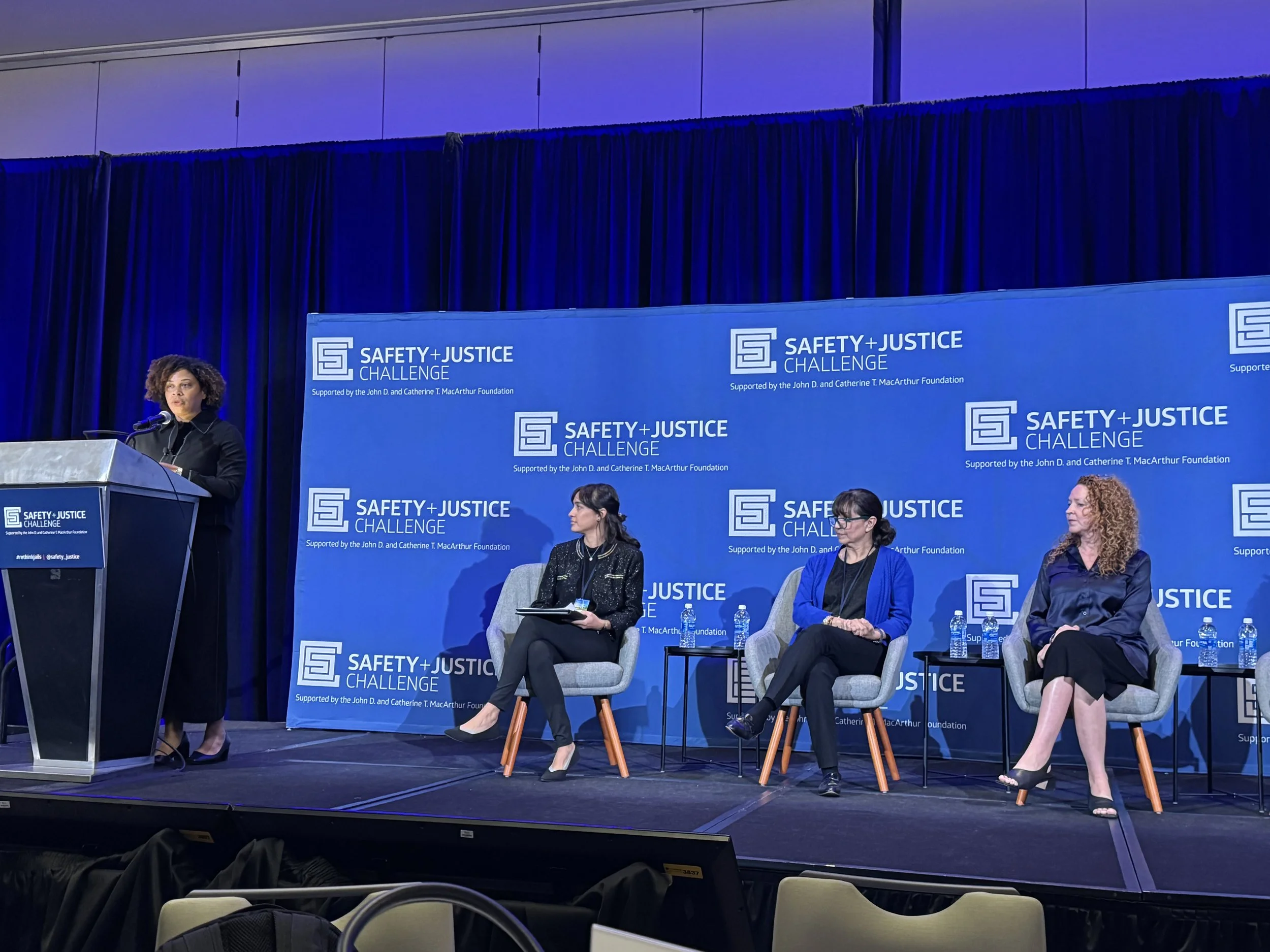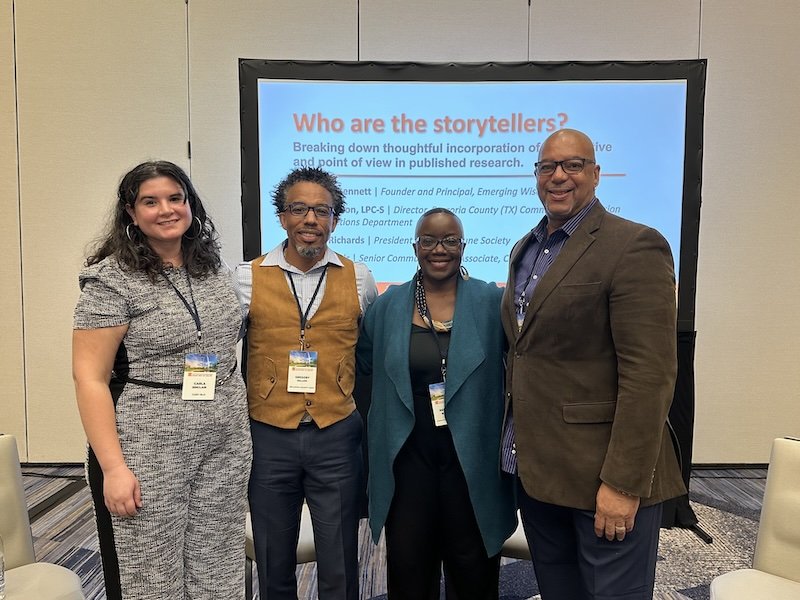RECAP: Inaugural SJC Research Symposium
By Diana Spahia, Senior Research Associate
This October, Safety and Justice Challenge (SJC) researchers, site practitioners, nonprofit leaders, and other research partners from across the country met in St. Louis, Missouri, for the inaugural SJC Research Symposium.
From its inception nearly a decade ago, the Safety and Justice Challenge (SJC) has relied heavily on a foundation of data and analysis to transform pretrial justice systems in jurisdictions around the country. Data and research not only played a role in supporting the over 50 jurisdictions nationwide that participate in the SJC; it has also provided a critical foundation for developing and sharing knowledge as well as lessons learned in advancing fair and effective reform work on a broader scale. The use of data to effect change on both of these levels is unprecedented in the field and positions the SJC to have impacts that go well beyond the life of the initiative.
The Symposium provided a space—after nearly a decade of identifying and implementing data-driven strategies to safely reduce jail populations and eliminate racial and ethnic disparities—to take stock of and celebrate SJC-funded research in a more targeted way. This included a behind-the-scenes look at the unprecedented SJC Data Repository compiled by CUNY ISLG and many of the in-depth analytic and research products that have been derived from it. In all, the event provided a platform for several timely SJC-related discussions, laying the foundation for future research and continued progress toward key goals.
While SJC research has documented many positive impacts of pretrial reform efforts on equity and justice goals, it has also surfaced questions and issue areas that should inform future directions for this work. While the SJC itself celebrated this 10-year milestone in St. Louis, it is important to remember this year also marks a decade since police in Ferguson, a suburb of St. Louis, killed 18-year-old Michael Brown. This incident sparked a movement for fundamental changes to our social consciousness and criminal legal practices. Looking back at the past decade of work, its clear progress has been made, but there are still many systemic issues to understand and address. Data and research will continue to be an important foundation for those efforts.
Attendees from across fields, states & experiences
The SJC Research Symposium attendees were a diverse mix of folks from different geographic locations, fields of study, and lived experiences. They included SJC site representatives, SJC Research Consortium Members, criminal legal scholars and academics, funders, technical assistance providers, and other SJC partners. The Symposium marked the first time that such a diverse mix of attendees were brought together to discuss the data, analytic, and research aspects of the Initiative, specifically.
“Networking with researchers, academics, and other sites highlighted the relevance and importance of our work.
I left the symposium feeling confident and inspired to do more and not give up. While decision makers do not always support research and are dismissive of studies that challenge the “status quo”; the symposium reminded me why I started doing this work over 25 years ago.
The SJC and ISLG opened doors that were previously closed.”
- Damir Kukec, Palm Beach County Criminal Justice Commission
Sessions reflected the wide range of SJC work
The two-day event had nearly 20 sessions designed to maximize networking, research and data discussion, and learning. The format prioritized attendee engagement and included a mix of plenary discussions, panel sessions, workshops, trainings and skills-building sessions, and intentional mingling opportunities.
All sessions were grounded in current SJC research and practice agenda priorities. Topics varied widely, from showcasing promising jail reduction practices to discussing how data and research can inform public narratives about crime to highlighting what we have learned about what it takes to eliminate racial and ethnic disparities. The sessions also put a spotlight on women and survivors, community engagement and participatory action research, data tools, and strategies that enhance leadership opportunities for the next generation.
“The SJC Research Symposium was very informative and enlightening. I appreciated hearing about the past, current and future efforts to empirically ground practices in the field.
Practitioners partnering with researchers is a great recipe for sustainable and transformative criminal justice advancements.”
- Dr. Kelvin L. Banks, DSW, MSW, MA, CTS
Some of the specific sessions include:
Understanding and Dismantling Racial and Ethnic Disparities
A series of research presentations that focused on equity kicked off the session to provide context and set the stage for a thought-provoking panel discussion led by the MacArthur Foundation’s Bria Gillum. The research showcased the need for intentionality when addressing racial and ethnic disparities; while there are promising approaches to jail decarceration, moving the needle on disparity reduction has been slower.
The conversation—which included speakers from Race Forward, Emerging Wisdom, and the Pretrial Justice Institute—discussed how racism is systemic, and that criminal legal systems are inherently fraught with inequities. As such, there is no one strategy that can be implemented to eliminate disparities. It must be a concerted, coordinated effort among agencies working together.
Community Safety, Data, and the Media
In “Safety Narratives: How Data Can be Used to Combat Misinformation in Public Discourse.” Marshall Project President Carroll Bogert spoke with panelists Sana Khan, Senior Research Associate at CUNY ISLG; Wendy Ware, President of the JFA Institute; Lee Slocum, Associate Professor and researcher at the University of Missouri, St. Louis; and LaRhonda Wilson, a professor at St. Louis Community College and local advocate.
This discussion left attendees with several important tips for how to get ahead of inaccurate media narratives on crime and safety, how to wield data effectively and appropriately, and how researchers and site partners can work together to present a united front and leverage media attention for more intentional messaging.
Reframing Research to Reach the Community
This workshop, led by CUNY ISLG’s Senior Communications Associate Carla Sinclair, brought together the perspectives of Gregory Dillon, Director of Brazoria County Community Supervision & Corrections; Stanley Richards, President and Chief Executive Officer of the Fortune Society, and Rebeccah Bennett, the Founder and Principal of Emerging Wisdom, LLC, who played a key role in The Ferguson Commission established to examine the root causes underlying the death of Michael Brown.
This discussion explored the thoughtful incorporation of community perspective and point of view in published research, interrogated whose voices should be elevated in research publications, and tactics for meaningfully including impacted individuals so that their voices are heard in research-based publications.
Data Exposition
A number of SJC sites have harnessed their data into publicly available data dashboards and tools that their counties can subsequently use to lead policy, practice, and decision-making. The Symposium’s Data Expo offered participants a chance to get a hands-on walkthrough of these tools and how data has been used in action. Highlighted sites included data experts from Philadelphia, Allegheny, Palm Beach, Santa Clara, and Cook counties, and showcased SJC’s own data tool, Measuring Progress.
“I had not had the opportunity to really sit with all the progress that was made through the SJC. It was powerful to see all the data points and the renewed interest in identifying ways to ensure that these numbers were tied to policy solutions or accessible to community organizations doing the work. Also, the importance of connecting this to the direct lived experience of people who have gone through those systems.
As someone leading work to uplift the Latine community, I am particularly excited to continue building on the work of the SJC to continue addressing racial and ethnic disparities through ensuring that the Latine demographic is accurately represented and that there are investments towards bringing more qualitative elements to numbers.”
- Hernán Carvente-Martinez, Alianza for Opportunity
The learnings and discussions from the Symposium left attendees feeling charged, motivated, and with an abundance of ideas for how to incorporate research learnings into their own work. Here’s how one participant summed up the event:
“One unique aspect of this event was how genuinely inclusive it felt; while many criminal justice conferences aim to bring together diverse voices, they often end up dominated by one particular group.
At the symposium, I felt that each group present had an equal platform, which grounded our discussions in a balance of real-world challenges and research-based solutions. I look forward to seeing how these insights take shape across the broader SJC community!”
- Julia Laskorunsky, University of Minnesota
In all, we found the event to be a success: a large yet intimate group of attendees that were deeply engaged and brought a variety of perspectives to the table; the opportunity for both SJC-affiliated and non-affiliated researchers and practitioners to come together to take a close look at research findings and data; and the space to hold socially relevant, timely discussions that are grounded in the SJC’s research priorities. Next year, we look forward to hosting a second Symposium, featuring updated research and data, and inclusive of even more practitioners, site stakeholders, and voices. We hope to see you there!
The CUNY ISLG team after a St. Louis-style BBQ dinner.
Photos by various CUNY ISLG staff.










